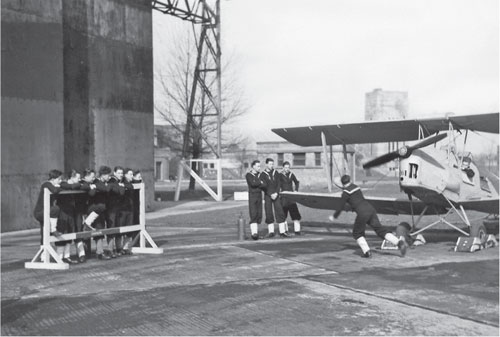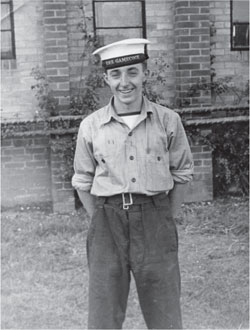Shooting 007: And Other Celluloid Adventures (6 page)
Read Shooting 007: And Other Celluloid Adventures Online
Authors: Sir Roger Moore Alec Mills

With onboard training completed, I was posted to HMS
Peregrine
in Sussex, attached to 603 Squadron. Ratings on a ship (a camp is called a ship) are divided into four watches: Port 1, Port 2, Starboard 1 and Starboard 2; my watch was Port 2. I had experienced a relatively sheltered existence at Carlton Hill; I would suggest that my adult education really began now.
From time to time I found myself on Guard Watch, where six ratings slept in the guardhouse overnight and remained on call should disturbances take place in the local town of Littlehampton, which usually occurred when drunken ratings ended up fighting with the local residents. This duty was undertaken once a month (more or less), but it was possible to have a substitute take your place with a written request submitted to the duty officer; if signed by the substitute this would normally be granted.

Practising how to start the propeller of an aircraft manually without losing your arm.

FX886962 Naval Airman Mills – Britain’s last line of defence …
Why, you may ask, would any idiot want to be a substitute to have a punch-up with drunken sailors? I can only suggest that the secret of this lies in naval history. There was a tradition in the navy of ‘splicing the main brace’, which I believe began in Lord Nelson’s time when sailors were given a measured tumbler of rum celebrating victory at Trafalgar. As I hate rum or spirits of any kind, I could give my ‘tot’ away or collect sixpence every time rum was issued. With my shipmates aware that extra rum was available to them in return for a favour, there would always be a willing hand to replace me for my weekend duties, to take over my Guard Watch.
With my application granted, I could now go home for the weekend, far away from the madness of this self-inflicted navy lark. However, there were times when my request for a replacement would be denied and I was required to do my duty in the guardhouse – as I was one Saturday night …
It was in the quiet early hours when the duty watch were hastily woken up and quickly dispatched into Littlehampton, a town where frustrated sailors went for a change of scenery – probably looking for girls – which inevitably ended in a fight. We sat sleepily in the back of the ‘tilly van’ (utility) resentful at being disturbed from our slumber, when the petty officer informed us why we had been woken up. It seemed that a rating had been arrested by the police for violent assault and put in a cell, so our job was to take him back to camp. He went on to describe the rating as a ‘total nutcase’ with the potential of being violent; we might need to restrain him. Following this report we quickly woke up, wondering what ape-like monster lay ahead. As I was the smallest in the patrol I could hardly see myself being useful if there was ‘a bit of a do’.
There he was, our bruised monster, lying crumpled in the corner of the cell, black-and-blue from the fight he had been in, though more likely this came from the three coppers standing guard over him – they did not look too good either. Fortunately our man was too weak to give any trouble. This was the moment when I decided only a fruit case would volunteer for a life such as this!
Although I make light of my short service in the navy, there were times when events captured my interest, as it was when applications for weekend substitutes were denied for reasons unknown. Suddenly a strange sense of secrecy hung in the air. Reporting to the guardhouse of my latest posting back at Lee-on-Solent, the duty watch were suddenly informed of an ‘invasion’ taking place that night; a military exercise designed to check on HMS
Daedalus
’s defences, with the RAF regiment playing the role of the enemy.
Exercises like this were necessary, if only to find out where the camp’s Achilles’ heel may perhaps lie. The officer went on to explain that the RAF regiment were commandos who would treat this exercise as if their lives depended on it, reminding us that this was not a game. Facing up to this challenge would require both watches, Port 1 and Port 2 (roughly 200 officers and men) to remain on call ready to defend our ‘ship’. We assembled in the canteen and the duty officer laid out his plan to outsmart the enemy.
‘Gentlemen’ – a rare compliment from an officer to the lower deck – ‘we will scatter our men around the camp’s perimeter; if the enemy are spotted whistles will be blown, showing which direction they are coming from. I am not anticipating any problems – any questions?’
None.
He continued, ‘In the unlikely event of breaching our defences the enemy will stick yellow labels on the target, showing that it has been blown up.’
The plan seemed fair enough, with everyone convinced we could handle this if only by weight of numbers. No problem! My nominated position was to guard the hangar on the south side and defend its valuable residents.
It was a clear moonlit night and one could see almost as well as by daylight – a bad night for an invasion, I thought to myself. With the long night carrying on into the early hours, perhaps the regiment would consider this unhelpful to their war games. With this in mind, I retreated into the shadows of the hangar, where I planned my next leave with friends back home, my thoughts allowing me to wallow in self-pity with Carlton Hill still lingering in the background. My dreams of the past were soon interrupted by a new challenge.
It was around three in the morning when war broke out, with whistles suddenly coming from all directions, guaranteeing pandemonium. I remained alert, ready to defend my hangar if necessary. The battle plan seemed to be going well, with receding whistles suggesting that the enemy were being driven back by the overwhelming force of Port Watch … when suddenly my attention was drawn to movement near the transport section where the petrol tankers were parked. Obviously we had fallen for the old five-card trick – an obvious lure, I thought to myself. I could now see legs moving around beneath the tankers as the regiment casually blew them up with their dangerous yellow labels. Could this, I wondered, be Naval Airman Mills’s big moment?
With my rifle raised – I had a rifle, no bullets – I approached the enemy, carefully watching their movements under the tankers. Clearly they had not seen my approach in this strange game we were playing. Finally I cornered them; it was movie time!
‘STICK ’EM UP!’ I said, with great authority.
The two 6-foot-plus giants looked down at me, their camouflaged faces unable to disguise their anger at being caught out. Receiving no response, I repeated my challenge, perhaps a little more anxious in the voice this time. Still no response came, so I reasoned that they had a different script to the one I had, a thought reinforced by the action they took next. Pointing their bayonets in my direction, they slowly moved towards me. At first I could not be sure if they were surrendering or what, but they gave me a clue when they removed my rifle from my clammy hands. It would seem that any further discussion was clearly out the question so I legged it. The bastards cheated; after all, I could hardly say, ‘Bang, bang! You’re dead!’
Worse was to come when I reported back to the officer in charge, the author of our brilliant tactics, explaining I had been robbed of my rifle. For one brief moment he reminded me of my old school teacher Mr Lee with his salty reply!
With the war games over we found ourselves drinking hot cocoa with the ‘enemy’ in the NAAFI, where we would now find out from the referees how we had fared in the exercise. Needless to say, we were sunk out of sight time and time again with their dangerous yellow labels. The two towering giants returned my ‘stolen’ rifle, which could only make my embarrassment more public, adding even more reason for the ‘pig’ to scowl at me.
I should explain that the term ‘pig’ is a rating’s word for an officer. I first learned this when the wardroom (officers) were playing a hockey match against the ratings. The ‘pigs’ arrived with only ten men, complaining they were at a disadvantage and would need someone to fill the position. Obviously they turned their attention to someone they considered officer material – me! Although I explained that I was not any good at the game, pointing out that was the reason why I was the linesman, they refused to listen to my feeble excuses. So now I found myself playing for the wardroom, a situation where I could not win, whatever the result: if the ratings won, my team had lost; if the officers won, I had betrayed my fellow ratings. My problem would quickly be resolved when the hard ball, travelling at speed, collided with my testicles! Lying on the grass in excruciating pain with blurred vision, the venom directed at me was reduced, if only for a brief moment. My shipmates had little sympathy to my crisis, preferring to laugh at my agony, until I was dragged to the side of the pitch to allow play to continue.
Here I should perhaps add that there was a tradition in the Royal Navy where ratings had to run across the quarterdeck (a small or large parade ground) while officers were allowed to walk. So now came a critical moment where this miserable human being from the lower deck approached this sacred area in excruciating pain. I could barely walk, let alone run, so my next challenge would come from the guardhouse on the other side of the holy ground which I was standing on.
Through my double vision I tried to attract the attention of the military police, waving my arm to seek their permission to drag myself across the hallowed ground. Of course I was ignored. I begged their understanding – their mercy – still with no helpful response coming to my aid. There would be no alternative but to take a chance and limp across the sanctum, holding my injured parts from rubbing against my legs. I suppose I had taken three or four steps, certainly no more, when the predictable scream rang out.
‘THAT RATING, COME HERE AT THE DOUBLE! – I SAID DOUBLE!’
The military police screamed their abuse at me, forcing a slight increase in speed, which caused even more pain as I dragged myself across the danger zone. It was only after a medical report that I was told I would not be put on a charge.
It was 1952. Two long years had passed, with everyone enjoying hot dry dusty summers, the humid conditions creating a stifling atmosphere which would bring on a strange attack of the asthma which I had believed had disappeared long ago in youth. I was on leave at the time, trying to control my breathing before going back to
Daedalus
. On my return to camp the doctor, seeing my condition, transferred me to Haslar Naval Hospital in Portsmouth, where I was given injections to calm the spasms. Checking my breathing, the doctor put a strange question to me: ‘Take your time, Mills. Do you like being in the navy?’


